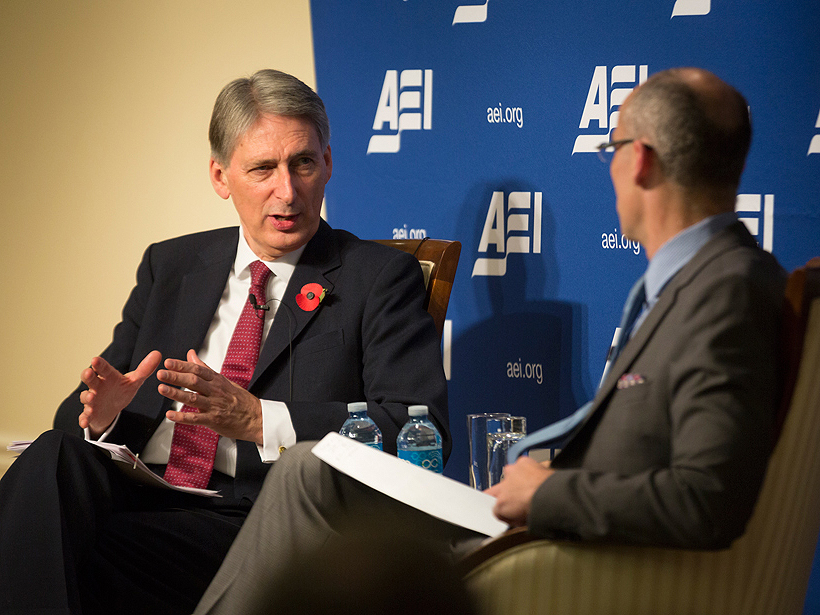Taking action to combat climate change “is the right thing to do, the conservative thing to do,” United Kingdom Foreign Secretary Philip Hammond stated last week in an address at the American Enterprise Institute (AEI), a conservative think tank based in Washington, D. C.
Hammond said that tackling climate change is consistent with conservative values—including market-based solutions and less emphasis on regulations—which he argued can help to protect the environment without damaging the economy.
“The smart thing to do is to harness the power of the market to tackle the challenges of climate change.”
“The smart thing to do is to harness the power of the market to tackle the challenges of climate change,” Hammond said in a 10 November talk timed a few weeks prior to the United Nations climate negotiations in Paris later this month. “If we don’t lead, others will decide the way forward, and their solutions may not be conservative ones. But if we do take the lead, we can ensure the global response is founded on the force of markets, the power of technology, and the institutions of capitalism.”
Choosing Prosperity and Safeguarding the Planet
The debate about how to deal with climate change has been dominated by people who opt to sacrifice economic growth and prosperity in order to meet the challenge, he said. “There are those on the left who have seen the need for action on climate change as a justification for large-scale mobilization, for a regulatory bonanza and a bigger state. If a purely regulatory approach was the answer, I have no doubt that economic growth would suffer,” he argued. “I don’t accept that we have to choose between our future prosperity and safeguarding the future of our planet. This is not a zero sum game. As conservatives, we choose both.”
Hammond contended that appropriate market mechanisms include carbon pricing, which he said is in place in the United Kingdom and in line with conservative values. “Carbon pricing corrects a market failure—that we have allowed carbon dioxide emissions to be a free good to the polluter,” he said. Accelerating the pace of innovation in green energy technologies is another winning strategy, according to Hammond.
The Economics of Climate Change
From an economic perspective, dealing with climate change can help to support the global low-carbon economy, which is already worth US$6 trillion with a 4%–5% annual growth rate, Hammond commented. He also pointed to the United Kingdom, where growth in the low-carbon sector is outpacing the economy as a whole.
Hammond acknowledged that action on climate change involves some hard choices and that some sectors, including coal, could be in for a difficult time.
Hammond acknowledged that action on climate change involves some hard choices and that some sectors, including coal, could be in for a difficult time. He called for careful thinking about how to manage the impact on people involved with those sectors. However, the costs of doing nothing on climate change “are potentially catastrophic,” Hammond argued, noting that inaction could lead to a significant drop in global consumption and other environmental and health costs that cannot be easily quantified in economic terms.
Hammond said that tackling climate change means taking the same type of precautionary approach that U.S. President Ronald Reagan employed in the 1980s to deal with the problem of ozone depletion.
“The evidence in favor of taking action to curb carbon emissions has been steadily mounting for decades. Uncertainty about the exact effects of climate change or the role of man’s activity in delivering it is not an excuse for inaction,” he said. “In every other facet of life, we assess the risks and where the risk of occurrence is high and the impacts are potentially catastrophic, we act to mitigate and to prevent. Our approach to climate change should be no different.”
A Market-Based Approach
In the United States, a market-based approach to tackling climate change has definite appeal, according to U.S. Department of Energy (DOE) Secretary Ernest Moniz. He was asked by Eos about Hammond’s remarks at an unrelated 13 November DOE briefing. In his view, Moniz said, “I think most of us believe ultimately that’s where we want to go.” But it requires cooperation with Congress, he added.
When President Barack Obama issued the White House Climate Action Plan in June 2013, Moniz noted, the president said, “Look, we’d love to work with Congress on this, but we can’t wait. And if Congress doesn’t want to act now, we are going to go ahead with the authorities that we have.”
In the meantime, the administration “has put together a pretty effective program, but it is sectoral by its nature,” Moniz said, noting that program includes a clean power plan and fuel standards for vehicles, among other measures. “If you really wanted to do an integrated economy-wide, market-based approach, we clearly need legislation for that.”
—Randy Showstack, Staff Writer
Citation: Showstack, R. (2015), Climate change is a conservative issue, British minister says, Eos, 96, doi:10.1029/2015EO039957. Published on 18 November 2015.
Text © 2015. The authors. CC BY-NC 3.0
Except where otherwise noted, images are subject to copyright. Any reuse without express permission from the copyright owner is prohibited.

